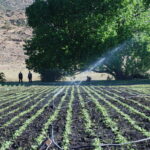Field Services
 The Department of Field Services is mandated to facilitate and provide all field agricultural extension services, programs and activities through Agricultural Information Services, Extension, Nutrition and Home economics Divisions.
The Department of Field Services is mandated to facilitate and provide all field agricultural extension services, programs and activities through Agricultural Information Services, Extension, Nutrition and Home economics Divisions.
Vision:
The vision of the department sees empowered clients with knowledge, having access to technology, information and appropriate farming practices for the sustainable management of natural resources so that this may contribute to household food security, commercialized production, employment creation and poverty alleviation.
Mission:
To facilitate and provide need-based knowledge, skills, information and innovation to clients through consultative participatory approaches and mass media to strengthen the capacity of stakeholders in planning, decision making, implementation and change management in a cost effective decentralized system relying on professional staff and appropriate techniques.
Overall goals
• To provide need based agricultural information for the empowerment of the clients in agricultural production.
• To create awareness on important agricultural related programs, projects and issues so that clients can make informed decisions.
• To improve knowledge and skills of stakeholders to optimize agricultural production
• To capacitate farmers, clients and or consumers to identify and find solutions to their own problems/challenges for optimal utilization of available resources.
• To promote the involvement of farmers, clients/customers and private sector in the delivery of extension services for improved/extended coverage
• To formulate appropriate information and extension policies so as to provide a conducive environment for quality service delivery.
• To provide guidance on the use of preventive nutrition so as to combat malnutrition and raise the nutritional status of Basotho.
• To provide technical expertise in methods that prolongs the shelf life of food as well as its quality, hygiene and safety in order to ensure food security.
• To encourage backyard food production to ensure adequate food availability all year round.
• To promote income-generating activities in order to improve the social and economic aspects of Basotho
Key performance areas:
The Department of Field services has three key performance areas, which simultaneously constitute three divisions of agricultural Information services, Extension, Nutrition and Home Economics.
The Agricultural Information Services division is responsible for dissemination of agricultural development related information within the policy laid down by government of Lesotho to the farming community through mass media. It acts as the public relations unit of the Ministry of Agriculture and Food Security. Its main sources of information are all the technical/production and service departments of the ministry.
A. Functional Objectives:
• To create awareness on specific agricultural topics to facilitate informed decisions on Agriculture Developments by clients.
• To provide relevant information through mass media communication so that farmers can increase production and generate income.
• To communicate the Ministry`s policies and programs to the public in order to keep them informed of current developments.
• To develop the ministerial data bank on agricultural information with intent to serve the information needs of agricultural stakeholders
• To facilitate the exchange of ideas and concerns by clients through media to increase the relevance and ownership of information services to farmers.
B. Key Functions and Activities
- To create awareness, inform and educate farming communities on agricultural developments
• To produce Agricultural Radio Farm Broadcasts (Re Bitsa Lihoai and Mpotse ke o Arabe)
• To produce agricultural teaching aids to support extension staff
• To plan, design and launch field seasonal and emergency campaigns on priority topics to support agricultural development
• To produce video and Mohoma Temeng television programs
• To write agricultural press releases for local media
• To produce quarterly farmers magazine (Mobu ke Letlotlo)
• To produce agricultural posters
• To print extension folders - To provide public address system during important events of the Ministry
- The division shall maintains the library services
- To print divisional and Ministry publications
The extension services is a national headquarters based division that coordinates districts extension programs and in-service training for district staff in extension methodology. The main focus being on the improvement of a responsive client/farmer participatory system to address farmers` needs. The division supervises the district agricultural offices.
A. Functional Objectives:
• To facilitate the implementation of the Unified Extension System to improve the quality of services
• To facilitate improvement of knowledge and skills of Extension Staff so that they can positively respond to the client needs.
• To facilitate networking between and within districts as well as regionally and internationally so that they can learn from one another.
• To review and update training programs for Farmers Training Centers to be responsive to client needs
• To promote the involvement of youth in agriculture and other income generating activities for sustainable agricultural production.
• To monitor and evaluate the performance of the Unified Extension System to ensure its effectiveness and efficiency.
• To facilitate the development of methods and standards for the involvement of community-based service providers and the private sector in delivery of extension services to improve their coverage and ownership.
B. Key functions and activities
• To monitor the operationalization of the Unified Extension System (UES) to improve extension management for good quality services delivery.
• To update and monitor District Economic Strategies
• To organize workshops to train staff on UES principles and skills
• To improve knowledge and skills of Extension staff.
• Organize management workshops for Districts Agricultural Officers
• Organize training workshops for District and Area Extension Officers on extension methodologies.
• Organize stakeholder workshops, study tours, shows and demonstrations for farming communities on various subjects.
• Review and update training programs for Farmer Training Centers to be responsive to farmer’s needs.
• Engage Youth in Agriculture and other Income generating activities.
• Develop capacity of Young Farmers on farming programs.
• To organize and facilitate the districts and National Agricultural Shows.
The function on the Nutrition and Home Economics division is to improve this nutritional status of the people of Lesotho through programs that solve immediate nutrition problems and at the same time build a strong foundation for ensuring household food security.
A. Functional Objectives:
1. To improve knowledge and skills of staff on home economics and Nutrition related issues so that they respond to changing clients` needs.
2. To monitor and evaluate the performance of the districts staff in providing Home Economics Services so as to ensure their relevance, efficiency and effectiveness
3. To promote the establishment and development of small -scale agro-industry through rational use of locally available resources to generate income
4. To produce training manuals on cottage industries and backyard farming to facilitate training in these areas
5. To develop processing methods for locally grown foods and products to increase income and improve storage properties.
6. To develop training manuals on food handling, hygiene, storage and preservation to facilitate training in these areas.
7. To ensure the availability of HIV/AIDS information, education and communication material so as to create awareness to bring about behavioral change.
Key functions and activities
a. To improve knowledge and skills in food technology and nutrition education to reduce prevalence of
malnutrition cases.
• Create awareness/ train clients in food handling, hygiene, storage and preservation.
• Prepare and broadcast radio programs on nutrition education
• Prepare information education and communication material on food and nutrition
• Conduct workshops on food based dietary guidelines.
b. To improve knowledge and skills that promotes Household Food Security and income generating
activities.
• To conduct workshops on organic food production
• To encourage backyard gardening
• To promote cottage industry skills.
• To train prison and home economics staff in food safety and hygiene.
c. To conduct necessary Research and Nutrition and Home economics activities for relevant
interventions.
d. To strengthen HIV/AIDS information, Education and Communication (IEC) programs within the
Agricultural sector for social mobilization and advocacy.







